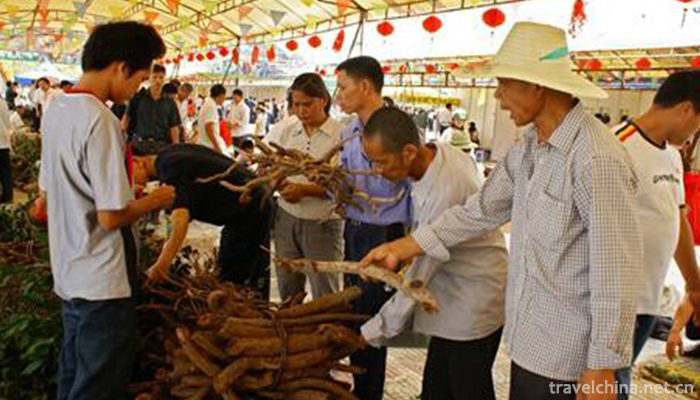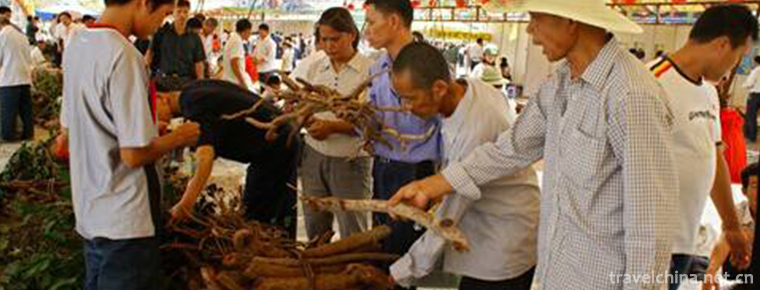Drug Market Customs
Drug Market Customs
Declaration area or unit: Zhangshu City, Jiangxi Province
Pharmaceutical market is a trade fair held regularly in the centralized distribution center of traditional Chinese medicines with historical origin. There are more than 110 centralized distribution centers of traditional Chinese medicines formed in the past dynasties. They have a wide influence in the whole country. They have complete functions of collecting, planting, making and using. They have a large amount of distribution and active trade in the four pharmaceuticals markets of Anguo, Camphor Tree, Baiquan and Yucheng. "."
Yao Wang Hui is a type of traditional temple fair, which appeared in Tang Dynasty. Sun Simiao, a famous doctor, is the industry God of traditional Chinese medicine and is respected as the "king of medicine". In addition, other famous doctors have been regarded as the "king of medicine" in a certain region in history. The temple fairs with King Yao as the God of faith are called "King Yao Hui". Most of the famous drug markets were developed by King Yao Hui, and some of them originated from the market trade of medicinal materials.
In addition to the drug trade, each drug market has formed its own trading rules, sacrificial rituals and traditional Chinese opera performances, entertainment activities and other folk customs, attracting the participation and appreciation of the broad masses of people outside the traders, making the drug market an influential local mass gathering place.
Zhangshu City is located in the central part of Jiangxi Province and the southern margin of Poyang Lake Plain. It has been the "main thoroughfare of eight provinces and the bustling city of industry and Commerce in central Jiangxi Province" since ancient times. Zhangshu began to appear in the Three Kingdoms, but in Tang Dynasty there was a medicine market. By Song Dynasty, it had formed a medicine market. In Ming Dynasty, it was known as "drug terminal". After entering Qing Dynasty, Zhangshu became "the collection of medicinal materials of North, South, Sichuan and Guangzhou". Practitioners of the "camphor gang" strict rules, processing techniques of Chinese herbal medicines excellence, forming a unique camphor medicinal custom.
In the Republic of China, traditional Chinese medicine was restricted, the market of traditional Chinese medicine was cut off, and the production and trade of medicinal materials were declining. Even so, camphor tree could still maintain its position in the provincial total market of medicinal materials. Since the founding of New China, Zhangshu has held a national drug Fair every year, which involves a wide range of regions, a large number of visitors, a large number of varieties and amounts of money. It ranks first in the national market of medicinal materials in North and South China. Therefore, the name of "medicinal capital" of Zhangshu has gradually risen and is highly respected by colleagues in the pharmaceutical industry at home and abroad.
Cinnamomum camphora medicinal customs include the trade customs of medicinal materials, processing of traditional Chinese medicine, medicinal diet, medicinal beliefs and other aspects. As a regional culture, its historical and cultural value can not be ignored. Today, the pharmaceutical industry is still one of the pillar industries in the economic development of camphor tree.


-
1.Old Beijing fried Morchella
The most famous famous food in Beijing is old Beijing tripe and Beijing roast duck. As for the oldest and most prosperous snacks in Beijing, belly burst is definitely the best among them.
Time 2018-10-27 -
2.Mung bean soup
Mung bean soup is a soup boiled with mung bean and water as the main ingredients. It has the functions of clearing heat, detoxifying, quenching thirst and relieving heat
Time 2018-11-02 -
3.Lianzhou Underground River Scenic Spot
Lianzhou City is located in the northwest of Guangdong Province and the upper reaches of Lianjiang River. The northeast is connected with Yizhang County in Hunan Province
Time 2018-12-12 -
4.Quail gruel
Ingredients: Quail, 100 grams of Japonica rice, 20 grams of red beans, 3 pieces of ginger, 10 grams of cooking wine, proper amount of salt, monosodium glutamate, pepper and sesame oil.
Time 2019-03-24 -
5.Zha Quan
Zha Quan is one of the five major schools of traditional Chinese long boxing, which is widely spread among Hui people. It originated in Shandong Province
Time 2019-04-15 -
6.Making Techniques of Pickled Vegetables
Making pickles, the traditional skills of Beijing Liubiju Food Co., Ltd., is one of the national intangible cultural heritage.
Time 2019-05-06 -
7.Nu Fairy Festival
Fairy Festival is a traditional folk festival of Nu people in Gongshan area of Yunnan Province. The local flower festival, also known as the Flower Festival, is held on March 15 of the lunar calendar
Time 2019-06-08 -
8.Sizhou opera
Sizhou Opera is one of the four major operas in Anhui Province. Its original name is Lahun Opera. It has a history of more than 200 years. Many people think that it originated in Haizhou, northern Jia
Time 2019-06-16 -
9.Yulin Xiaoqu
The lyrics of Yulin Xiaoqu are integrated with elegance and vulgarity. In terms of language style and structure, there are not only words used by ordinary scholars, but also local dialects and dialect
Time 2019-07-14 -
10.The Lantern Festival
Lantern Festival, also known as the Lantern Festival, the Little January Festival, the Lantern Festival or the Lantern Festival, is one of the traditional festivals in China. The first month is the fi
Time 2019-07-16 -
11.Zhaohua ancient city
Zhaohua ancient city is located in Zhaohua Town, Zhaohua District, Guangyuan City, Sichuan Province. After that, Zhaochang county was renamed as Yichang county. Located at the confluence of Bailong River, Jialing River and Qingjiang River, the Jialing River flows here with Wancheng water system and natural Taiji. It has the reputation of "the world's first landscape Taiji" natural wonder.
Time 2020-11-08 -
12.Yibin economy
In 2019, Yibin City will realize a GDP of 260.189 billion yuan, an increase of 8.8% over the previous year in terms of comparable prices. Among them, the added value of the primary industry was 27.764 billion yuan, an increase of 2.9%; the add
Time 2020-12-18